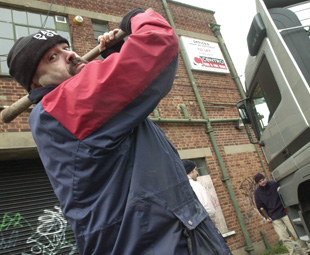Dark days for trucking

You’re sound asleep in your cab after a long day’s haul. Suddenly, a crashing noise shakes you awake. You become aware of two dark shapes in your truck and realise that there is a gun pointed at your head …
According to Crime Stats, an online statistics resource, 943 truck hijackings have taken place in South Africa this year.
Dismissing cases where hijackings happen to the same victims more than once a year (a terrible thought), this means that almost 1 000 truckers are faced with at least one life-threatening situation on a yearly basis.
The statistics are borne out by real-life experiences on the roads. During a series of interviews recently conducted by FOCUS with truckers at various garages on the N1 in the Johannesburg area, the drivers’ fear of this rising wave of crime became clear.
“They (the hijackers) often come for us at night, when we’re sleeping,” one fuel haulier says. “Anyone still asleep by nine at night is looking for trouble.”
He adds: “This makes us exhausted. We do not feel safe anymore.”
Trucks are often hijacked instead of carjacked; that is, criminals are mostly after the goods that they are hauling. These goods often rival the cost of a truck. As hijackings are often coordinated events, it requires a certain type of efficiency and teamwork. What this means is that criminals that hijack trucks are experienced, hardened law-breakers with deadly methods of operation.
Despite various safety measures such as closed circuit television (CCTV) cameras, extra highway patrols and advanced vehicle tracking technology, truckers nevertheless remain a prey of choice for the criminal underbelly of South Africa.
According to Helpguide, a free online resource with a user-base of roughly 50 million people per annum, physical and psychological effects of trauma caused by events such as violent crimes include nausea, tremors, sleep disturbance, unfounded guilt, confusion, memory problems and the inability to concentrate.
It adds: “After a traumatic experience, the mind and body are in shock. But, as you make sense of what happened and process your emotions, you come out of it. With Post Traumatic Stress Disorder (PTSD), however, you remain in psychological shock. Your memory of what happened and your feelings about it are disconnected.”
What this means is that even if a truck driver was to come from a hijacking unscathed, the experience can still leave him with scars that can negatively affect his driving abilities.
“I’m lucky that I have not been in any hijackings or such,” says another trucker. “But everyone knows that nowadays it’s becoming unsafe to sleep or rest at many truck stops.”
Day in and day out, truckers are on the road or sleeping in the bunk bed sections of their trucks. Not only are they in danger of being hijacked at such vulnerable times, but there is also practically no one at hand to help them deal with the fear and stress this situation creates.
With rarely anything but the stress of the highway traffic and arrival deadlines to keep them company, they live alone in a capsule universe. Who then will recognise the symptoms of something as bad as PTSD should they arise?
It is essential for management to maintain constant dialogue and interaction with drivers in order to recognise the effects of PTSD. Knowledge of the drivers’ dispositions and personalities improves the ability of managers to assess their behaviour objectively. This helps to recognise any drastic changes in their character before it’s too late.
Furthermore, raising awareness of the symptoms of PTSD (or lesser cases of trauma) among drivers themselves is even more crucial as they are, after all, mostly dependent upon their own resources.
Helpguide also states that places and activities associated with events such as accidents and hijackings are among the things that may also trigger trauma-induced behaviour. Imagine then, the effect that driving the same route on which they had been hijacked, would have on truck drivers with undiagnosed PTSD or lesser cases of trauma.
The effects of PTSD do not necessarily present themselves immediately after a traumatic event, but often emerge months or years later.
Though many of the drivers declined to comment on their attitudes towards hijackings and its threat to their wellbeing, one driver stated that fleet managers and operators sometimes have a thick-skinned attitude towards drivers and the criminals they face.
FOCUS’s own findings, however, painted a different picture in regard to this matter. Many operators do in fact offer trauma counselling to their truckers after hijackings.
For example, Des Wood, transport manager of Bigfoot Express, states: “Hypothetically, if it ever happens that we find a driver whose duties are being impeded by such trauma, we will immediately find trauma specialists to help him. However, we’re lucky that in the last five years, we’ve only had two hijackings.”
For the effective treatment of PTSD, and other trauma-induced ailments, professional help is the best option. Therapy of this sort involves two-way input from both trained and experienced therapists and the patients themselves.
In trauma-focused cognitive behavioural therapy, for example, special care is taken to allow a patient to carefully and gradually peel away at the layers of psychoses it may have built up around a trauma. By helping the patient to identify upsetting thoughts, one can gradually “replace” them with a more balanced picture of the events that had transpired.
There are some quick-fix remedies for truckers and operators on how to deal with and lessen the ongoing threat of hijackings, however. One simple strategy that Bigfoot Express employs to lessen the chances of a hijackings taking place is to always have two drivers present on long hauls. This means that rest stops are significantly shorter, as the drivers take shifts at the wheel and stopping for sleep is therefore superfluous.
Using such a team-based system may also help truckers to communicate with each other on a more regular basis, helping them share the various stresses of their road-warrior lifestyle.
Crime will sadly always be present in society, however, as those who wish to prey on the honest rarely play by society’s rules.
However, there remains hope for truck drivers in the form of therapy and support from their peers and supervisors. With advancements in social media and fleet management, it is also easier for truckers to communicate their feelings and distress with the outside world. Should they make their voices heard, it is most definitely our obligation to listen.
Published by
Focus on Transport
focusmagsa




